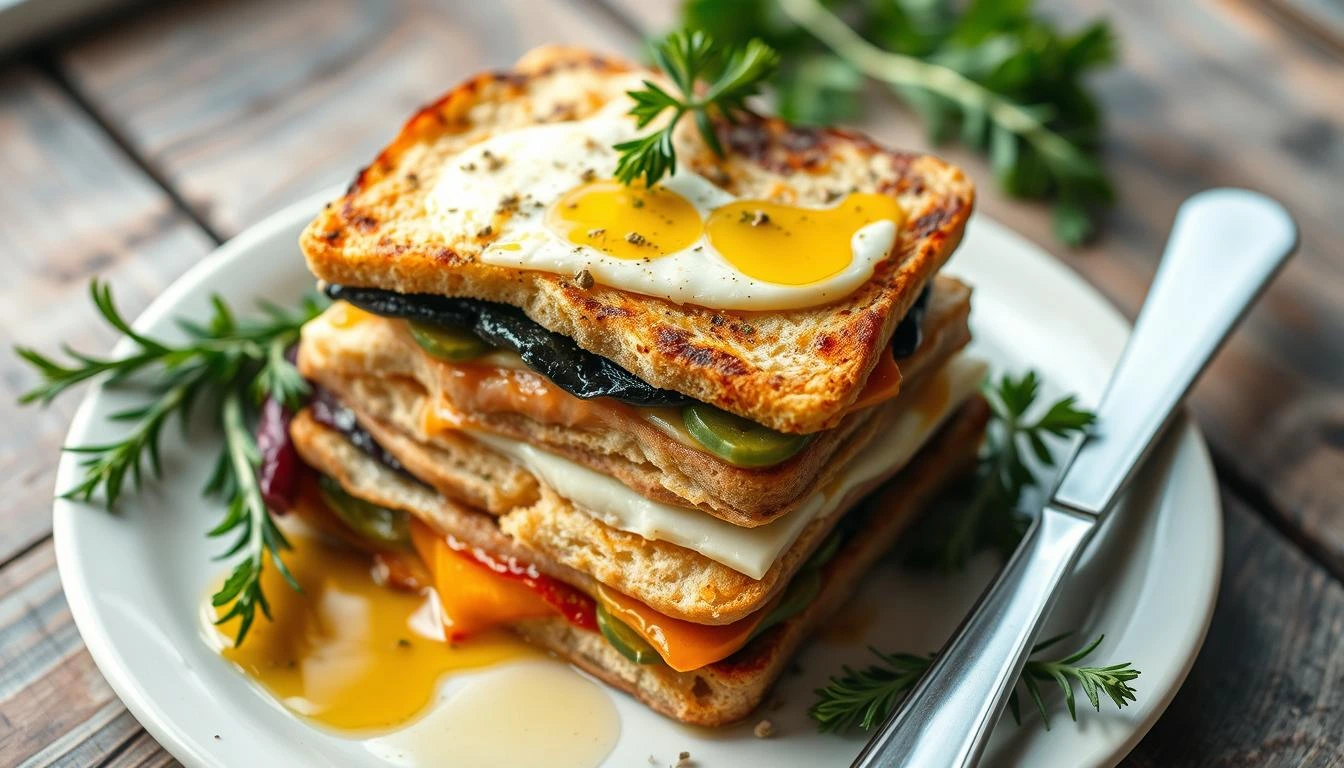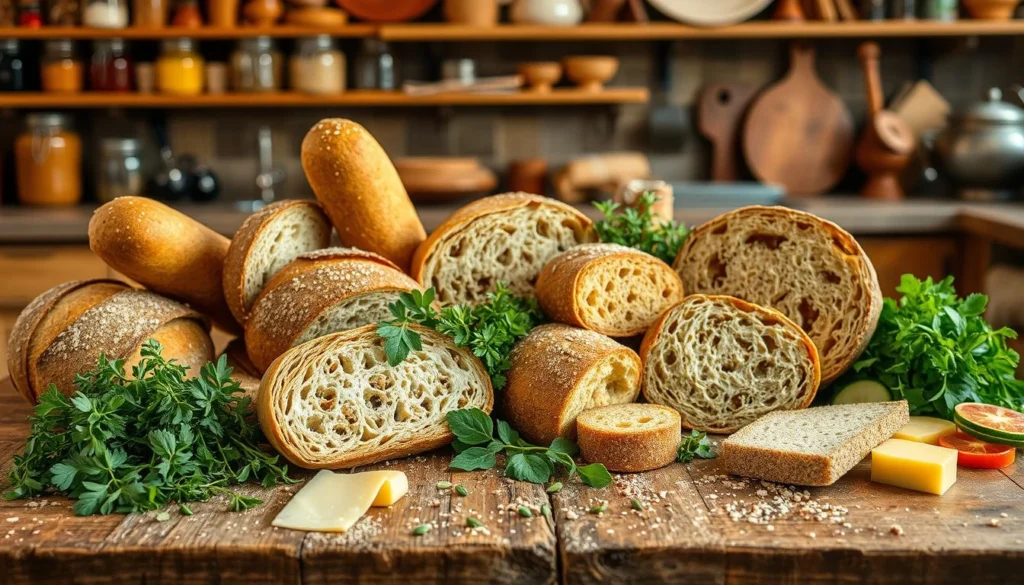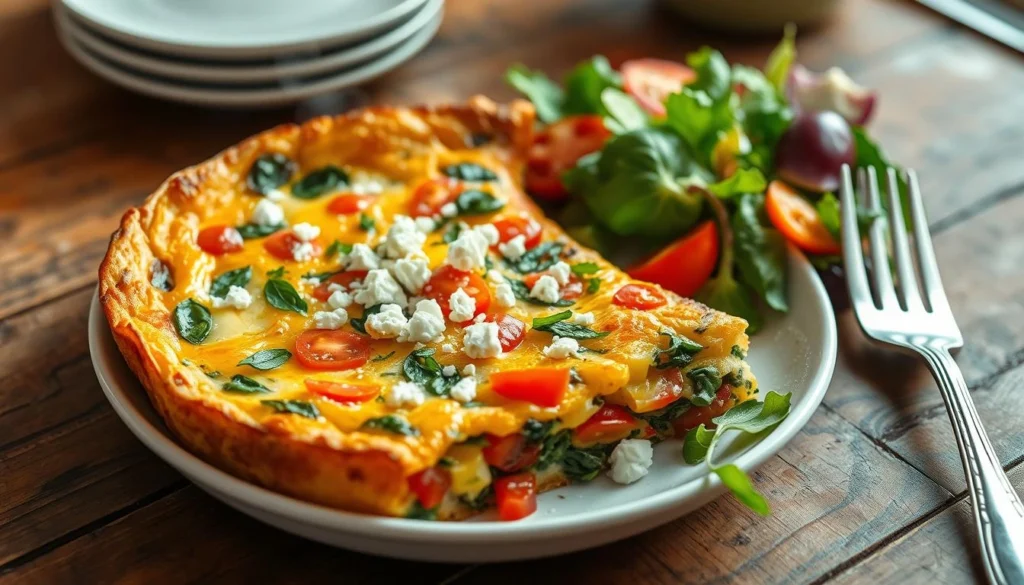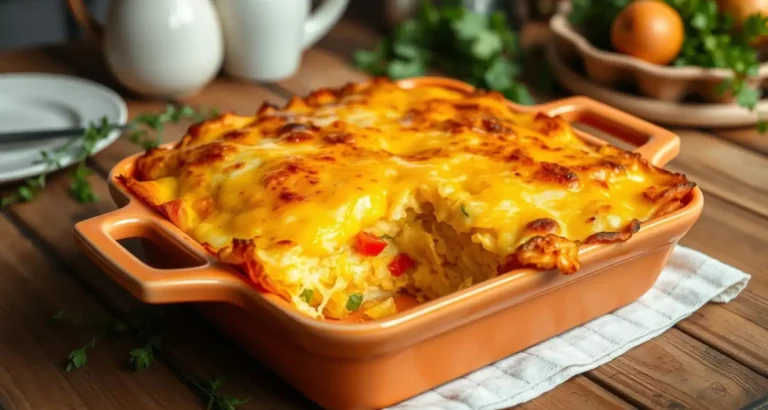
Classic Breakfast Strata with Dijon Mustard
Equipment
- Large mixing bowl
- Whisk
- Baking dish (9×13 inch recommended)
- Knife
- Cutting board
- Oven
Ingredients
Base Ingredients
- 6 Large eggs
- 2 cups Milk or half-and-half
- 1 tbsp Dijon mustard
- Salt and pepper, to taste
Bread and Cheese
- 4 cups Cubed sourdough or brioche bread preferably day-old or toasted
- 1 cup Sharp cheddar cheese grated
- 1 cup Gruyère cheese grated
- 1/2 cup Mozzarella cheese shredded
Optional Add-ins
- 1 cup Sautéed mushrooms
- 1/2 cup Diced onions
- 1 cup Cooked sausage or bacon crumbled
- 1/2 cup Cherry tomatoes halved
- Fresh herbs like basil or parsley for garnish
Instructions
Prepare the Bread
- Cube the bread into 1-inch pieces. If using fresh bread, lightly toast or leave out for a few hours to dry.
Make the Egg Mixture
- In a large mixing bowl, whisk together the eggs, milk (or half-and-half), Dijon mustard, salt, and pepper.
Assemble the Strata
- Grease a 9×13 inch baking dish. Layer half of the bread cubes at the bottom.
- Sprinkle a layer of cheddar and Gruyère cheese, followed by the optional add-ins (like mushrooms, onions, sausage).
- Repeat the layers, finishing with a final sprinkle of cheese on top.
Add the Egg Mixture
- Pour the egg mixture evenly over the bread and cheese layers. Press down gently to ensure the bread absorbs the liquid.
Chill and Bake
- Cover the dish with plastic wrap and refrigerate for at least 8 hours or overnight.
- Preheat the oven to 350°F (175°C). Let the strata sit at room temperature for 30 minutes before baking.
- Bake uncovered for 45-60 minutes, or until the top is golden brown and a knife inserted into the center comes out clean.
Serve
- Allow to cool for 5-10 minutes before serving. Garnish with fresh herbs if desired.
Notes
Tips & Variations
- Make-Ahead Tip: Assemble the strata the night before and refrigerate. This allows the bread to fully absorb the custard mixture, resulting in a creamier texture.
- Storage: Leftovers can be stored in an airtight container in the refrigerator for up to 3 days.
- Reheating: Warm in the oven at 300°F (150°C) for about 15 minutes or microwave individual portions for 1-2 minutes.
- Custom Variations: Swap out the cheeses or add your favorite seasonal ingredients like asparagus in spring or pumpkin in fall.
Strata Recipe: what unusual ingredient is used?
Table of Contents
Have you ever wondered what makes a strata recipe special? As you explore breakfast casseroles, one ingredient stands out. It’s Dijon mustard, the secret to amazing flavors and textures.
Stratas are a hit with home cooks and food lovers. They combine savory, creamy, and indulgent tastes. Adding Dijon mustard can take your strata to the next level, turning it into a dish that everyone will love.
We’ll dive into the secrets of a perfect strata recipe. You’ll learn how Dijon mustard boosts the flavor. You’ll get tips on choosing ingredients and preparing them. With this knowledge, you’ll make a strata that wow everyone.
Understanding Breakfast Strata: A Classic Morning Casserole
Breakfast strata, also known as “strata egg dish,” have a rich history. They come from Italy and have become a favorite for brunch and casual gatherings.
Origins and Evolution of Breakfast Strata
The strata idea started with the Italian dish “Ribollita,” a bread pudding with eggs and cheese. When it came to America, it changed. Now, it includes breakfast items like sausage and ham, making it a modern favorite.
Why Stratas Are Perfect for Entertaining
Stratas are a hit for hosts and hostesses. They’re easy to prepare ahead of time and can feed many. The egg strata recipe and strata egg dish can be made in many ways, to please everyone’s taste.
| Advantages of Breakfast Stratas | Disadvantages of Breakfast Stratas |
| Requires planning and prep time might not be suitable for those with particular dietary restrictions.Can be labor-intensive to assemble | Requires planning and prep timeMight not be suitable for those with particular dietary restrictions.Can be labor-intensive to assemble |
Breakfast strata make the perfect crowd-pleasing casserole, ideal for any occasion when you want to delight and impress your guests with a flavorful, visually appealing dish.
Essential Ingredients for a Perfect Strata Recipe
Making the perfect strata recipe or breakfast egg strata needs a mix of key ingredients. From fluffy eggs to creamy sauce, each part is crucial for that perfect taste. Let’s look at the main elements that make a simple casserole into a standout breakfast or brunch dish.
The base of a great strata recipe is top-notch bread. Choose from a crusty sourdough or soft challah. The bread soaks up the eggy custard and cheese, affecting the dish’s taste and texture.
The eggs are the heart of the breakfast egg strata. They should be beaten until smooth and creamy. Using fresh, quality eggs is key for the best taste.
A mix of cheeses adds creaminess and a melty layer. Sharp cheddar, tangy Gruyère, and a bit of Parmesan make it rich and indulgent.
A blend of milk and cream (or half-and-half) creates a silky sauce. The right mix of dairy and eggs is important for the dish’s richness and texture.
Seasoning with salt, pepper, herbs, and spices boosts the flavors.
Mastering these ingredients will help you make a strata recipe everyone will love. Your family and guests will look forward to the next bite of this classic breakfast casserole.
The Unusual Secret Ingredient: Dijon Mustard’s Magic Touch
Dijon mustard is a surprising ingredient that can make your strata recipe stand out. It’s often overlooked in breakfast dishes but can turn a simple cheesy egg strata into a masterpiece.
How Dijon Enhances Flavor Profiles
Dijon mustard adds a unique flavor to strata recipes. Its tangy and slightly pungent taste balances the richness of eggs and cheese. This brings together flavors in perfect harmony, sparking excitement with every bite.
Choosing the Right Mustard Variety
Not all mustards are good for strata recipes. Choose a high-quality Dijon-style mustard. It should have brown and yellow mustard seeds, white wine, and other aromatic ingredients. Stay away from spicy or strongly flavored mustards to avoid overpowering the strata’s delicate flavors.
Proper Mustard Incorporation Techniques
To mix Dijon mustard into your strata right, whisk it into the egg mixture. Make sure it’s spread evenly throughout the custard before adding it to the bread and cheese layers. This way, the mustard’s flavor is in every bite.
Using Dijon mustard can take your strata recipe to new heights. It’s perfect for both classic cheesy egg strata and seasonal flavors. This unexpected ingredient will impress your guests and leave them wanting more.
Bread Selection: The Foundation of Your Strata
Choosing the right bread is key to a great breakfast egg strata. The bread absorbs the custard and adds its texture. Whether it’s light brioche or rustic sourdough, the bread choice is crucial.
Exploring Bread Options for Strata
Sourdough is a top pick for a strata egg dish. Its tangy taste and chewy feel pair well with creamy custard. Brioche, with its golden color and buttery taste, adds a luxurious touch.
Whole-grain or multigrain breads are great for a heartier option. They add nutrition and a chewy texture that contrasts with the creamy custard.
Preparing the Bread
- Dry or toast the bread to ensure it absorbs the custard mixture without becoming soggy.
- Cubing the bread helps it distribute evenly throughout the strata, creating a consistent texture.
- If using fresh bread, let it sit out for a few hours to allow it to slightly dry before assembling the strata.
| Bread Type | Characteristics | Best for Strata |
| Sourdough | Tangy flavor, chewy texture | Classic strata egg dish |
| Brioche | Golden, buttery richness | Indulgent breakfast egg strata |
| Whole-Grain | Hearty, nutritious | Healthier strata egg dish options |
The bread is the base of your strata egg dish. With the right choice and preparation, your breakfast egg strata will be a hit.

Best Cheese Combinations for a Creamy Strata
Choosing the right cheese is key to a great cheesy egg strata. Mixing aged and fresh cheeses can make your strata incredibly creamy and delicious.
Aged vs. Fresh Cheese Options
Aged cheeses like sharp cheddar or Gruyère add a deep, nutty flavor. They melt well, making the strata rich and creamy. Fresh cheeses, like mozzarella or ricotta, bring a soft creaminess and a gooey texture.
Cheese Layering Techniques
- Begin with a bread layer, followed by a layer of aged cheese, such as cheddar or Gruyère.
- Next, add a layer of fresh cheese, like mozzarella or ricotta, for creaminess.
- Continue alternating bread, aged cheese, and fresh cheese until you top the dish with aged cheese.
- This method ensures the cheeses melt together beautifully, creating a cheesy strata that wow everyone.
| Aged Cheese Options | Fresh Cheese Options |
| Sharp Cheddar | Mozzarella |
| Gruyère | Ricotta |
| Parmesan | Fontina |
| Gouda | Provolone |
By blending aged and fresh cheeses, you can make a cheesy egg strata that looks and tastes amazing. Try different cheese combinations to find the perfect mix for your strata recipe.
Make-Ahead Tips and Overnight Preparation
Creating a delicious overnight breakfast or egg strata recipe starts with preparation. Preparing your strata ahead of time saves time and lets flavors blend. This makes for a truly exceptional dish.
One big advantage of making your strata ahead is letting bread soak up the custard. This makes the strata creamy and cohesive. The longer it soaks, the deeper the flavors become, making breakfast more satisfying.
- Assemble the strata in your baking dish the day before, cover, and refrigerate overnight. This gives the bread ample time to absorb the custard mixture.
- For best results, let the strata sit in the fridge for at least 8 hours, or up to 24 hours. Allowing it to rest longer enhances the melding of flavors.
- When ready to bake, remove the strata from the fridge and let it sit at room temperature for 30 minutes before popping it in the oven. This helps the dish come to temperature evenly, ensuring a perfect bake.
Preparing your overnight breakfast or egg strata recipe in advance is worth it. You’ll get a dish that’s convenient and full of flavor. So, next time you’re hosting brunch or need a make-ahead breakfast, try this method.
| Preparation Time | Refrigeration Time | Baking Time |
| 15-20 minutes | 8-24 hours | 45-60 minutes |
Customizing Your Strata with Seasonal Add-ins
One of the joys of a classic strata recipe is its versatility. By adding seasonal ingredients, you can keep your breakfast egg strata exciting all year. Let’s explore some tasty variations to elevate your strata game with the changing seasons.
Spring and Summer Variations
As the weather warms, enjoy the vibrant flavors of spring and summer. Add diced asparagus, cherry tomatoes, and fresh basil for a light, herbal touch. Swap traditional bread for croissant cubes for a buttery, flaky texture.
For a sweeter twist, fold in juicy berries like raspberries, blueberries, or sliced strawberries. Add a sprinkle of brown sugar and a hint of lemon zest. This balances the richness of the strata recipe.
Fall and Winter Options
As the leaves turn and the air grows crisp, transition your breakfast egg strata to cozy, autumnal flavors. Sautéed mushrooms, caramelized onions, and diced butternut squash make a delightful combination.
For a heartier version, add crumbled sausage or bacon, shredded cheddar cheese, and a touch of maple syrup. The savory-sweet pairing will warm you from the inside out.
Embrace winter with diced pears, toasted walnuts, and a dash of ground cinnamon. The natural sweetness and crunchy texture will elevate your strata recipe to new heights.
“Incorporating seasonal ingredients into your strata is a delightful way to keep your breakfast offerings vibrant and interesting all year long.”
Troubleshooting Common Strata Problems
Making the perfect strata egg dish can be tricky. But with the right tips, you can avoid common problems and get great results. Here are a few typical problems along with solutions to address them.
Soggy or Dry Strata
One big problem with egg strata recipes is they can be too soggy or dry. To avoid sogginess, use the right amount of bread and eggs. Make sure the bread soaks up the custard well before baking. If it’s too dry, add more milk or cream to the custard.
Uneven Cooking
Getting the strata to cook evenly can be hard, especially in deep dishes. Try using a shallower pan or cutting the bread into smaller pieces. Also, rotate the dish while it’s baking to help cook it evenly.

Tough or Rubbery Texture
If your strata egg dish is tough or rubbery, it might be because the eggs are overcooked. Watch the baking time and temperature closely. Try reducing the baking temperature and extending the cooking time. Adding more milk or cream can also make it softer and creamier.
By fixing these common egg strata recipe problems, you’ll get better at making fluffy, tasty strata. With practice and these tips, your breakfast casserole will impress everyone.
Conclusion
Your journey through strata recipes has been exciting. You’ve learned about flavors, textures, and a secret ingredient – Dijon mustard. This mustard makes the breakfast casserole special.
You now know how to make your strata. This will impress your family and friends. You’ve learned the basics and how to add your twist.
Strata is very versatile. You can try different breads, cheeses, and add-ins. Dijon mustard is the key to a great strata. It adds a unique flavor that makes your dish stand out.
Keep exploring strata recipes and share your creations. Strata brings people together. By sharing your love for strata, you can inspire others to try it too.
Let your creativity shine in every strata you make. Strata-making is an art. Enjoy the process and make delicious breakfast casseroles for everyone to enjoy.
FAQ
What unusual ingredient is used in a strata recipe?
Dijon mustard is the secret ingredient in strata recipes. It contributes a delicate flavor that elevates the dish.
What is the origin and evolution of breakfast strata?
Breakfast strata comes from the Italian “torta di pane.” It evolved into a popular breakfast casserole in the U.S. for entertaining.
Why are strata perfect for entertaining?
Stratas are great for entertaining because they’re easy to make ahead. They’re also versatile, allowing for customization to please everyone.
What are the essential ingredients for a perfect strata recipe?
A good strata needs eggs, bread, cheese, milk, and seasonings. The right mix of these ingredients is key for flavor and texture.
How does Dijon mustard enhance the flavor of a strata?
Dijon mustard adds a unique spice and tanginess. It balances the richness of eggs and cheese, enhancing the overall taste.
What type of bread is best for a strata, and how should it be prepared?
Choose bread like sourdough, brioche, or whole grain for a strata. Dry or lightly toast the bread for better texture.
What are the best cheese combinations for a creamy strata?
Use a mix of aged and fresh cheeses like cheddar, Gruyère, and ricotta. This ensures creamy and flavorful layers.
How can I prepare a strata in advance?
Assemble the strata, cover, and refrigerate overnight or for up to 2 days. This allows the bread to soak up the custard, improving flavor and texture.
How can I customize a strata with seasonal ingredients?
Add fresh herbs, tomatoes, or asparagus in spring and summer. For fall and winter, try pumpkin, apples, or sausage.
What are some common issues with strata and how can I troubleshoot them?
Issues like sogginess or uneven cooking can happen. Dry the bread well, use the right liquid-to-egg ratio, and let it rest before baking.







